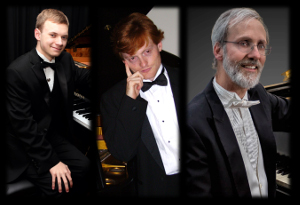Let’s call it a recital of 20th century music for piano duet and two pianos, although that may be stretching things by six years or so on the leading edge. In Baldwin Auditorium, on Duke’s East Campus, Phyllis East, of SUNY Fredonia, made one of her periodic Tar Heel State visits for an appearance with her student, Duke-based pianist and coach David Heid. The program was part of the University’s ongoing celebration of its four new Steinways, but chances are the two sleek instruments on the stage were unhappy in the muggy air of the hall on this particularly muggy evening – and never mind the likely discomfort of the artists in their concert finery. East seems to have found the fountain of youth and youthful energy in or near Fredonia or else she was just barely out of grade school when Heid signed on for lessons. In any event, this was a heartwarming occasion that must have been intensely satisfying to both players, for how often does one get to transform a student-teacher relationship to one of co-equal adult artistic collaborators?
Things got underway with a lovely little group of music for two pianos by Poulenc, with Heid taking piano 1. “L’embarquement pour Cythère,” an amusing “waltz to the accordion,” composed in 1951 for a film, was followed by a surprisingly effective “Elégie” (1959) – surprising because it was basically an alternating-chords work, as Heid’s program annotations succinctly noted.* Both of these opening works were written for Gold and Fizdale, one of the top duos of their day. Then came a brief Sonata (1918, rev. 1939), published for realization as a duet or on two pianos. The two-piano version was heard on this occasion, and there was wondrous sonority and richness as these artists zipped through its three bracing and satisfying movements, clearly relishing the intricacies and delights of the musical dialogue.
Composer John Corigliano grew up as an “orchestra brat”; his father was a long-time concertmaster of the New York Philharmonic. At the outset, his Gazebo Dances (1972), for piano four hands, struck this listener as more indebted to Stravinsky (Petrushka in particular came to mind) than Rossini, as the composer himself has written, but in any event, Heid and East made the work engaging in every respect, bringing out the spikiness of the opening movement (“Overture” ), the somewhat bizarre gait of the second (” Waltz”), the undeniable serenity – despite its occasional angularity – of the third (“Adagio”), and the dazzling pianistic brilliance of the finale (” Tarantella”) – which seemed a good deal more Rossinian than the first part.
Two all-enveloping Rachmaninov song transcriptions – “Vocalise” (1912) and “Floods of Spring” (1894, also known as “Spring Waters”) – brought the first half to a close with passion and high style, too. The two-piano arrangements were by the great Victor Babin, of Vronsky and Babin fame.
We returned to even more familiar fare at the start of the second half, when the artists took up Gaston Choisnel’s two-piano version of Ravel’s Ma Mère l’Oye (the famous Mother Goose Suite, composed as a duet 1908-10 and orchestrated 1911). This transcription is said to have included some enhancements from the orchestral score that weren’t in Ravel’s original four-hands version, although these touches eluded this listener – it might take a comparison of the scores to pinpoint the differences. In any event, this intensely popular and much-loved music received a glowing rendition, drenched with “atmosphere” and so true to the apparent intent of the composer (as we understand it…) that it seemed every bit as effective as the work’s orchestral incarnation.
A suite of short – very short – Moravian dances, set by Janácek for piano duet across a span of years and finally grouped together in 1904, reminded us that this great master, who produced a vast amount of keyboard music, was in his way every bit as great an ethnomusicologist as his Hungarian contemporary Bartók. These things for the most part flew by, making one lament that they weren’t given twice – particularly since recordings of the complete set seem no longer to be available. (So if you want to hear ’em, I guess you gotta play ’em!)
The concert came to a close with Lutoslawski’s brilliant and dazzling Variations on a Theme of Paganini (1941). This is the same Paganini theme Old Stoneface (Rachmaninov) used for his Rhapsody (written just seven years earlier, in 1934), and it’s always a treat to hear Lutoslawski’s take on the tune, as a demonstration of how two contemporaneous masters were able to come up with entirely different approaches to a common theme. This piece is basically loud and fast, in the best orchestral-program-making tradition for a sure-fire, winning grand finale, and the performance brought the small but dedicated audience to its feet with yells and cheers. This response in turn elicited a single encore, the Babin transcription of Rachmaninov’s “Love’s Flame” (1894).
Duke’s “Grand Piano Celebration” (of its new instruments) continues on Monday, October 19, with a conversation with Murray Perahia, on the eve of his Duke Performances recital. Perahia’s talk is free, as was the present East-Heid program. See our calendar for details.
*We could have done without the quote from Poulenc in the last lines of the notes on “Elégie”: ” It’s very simple, perhaps too much so for serious critics, but hard luck. To hell with them!”











